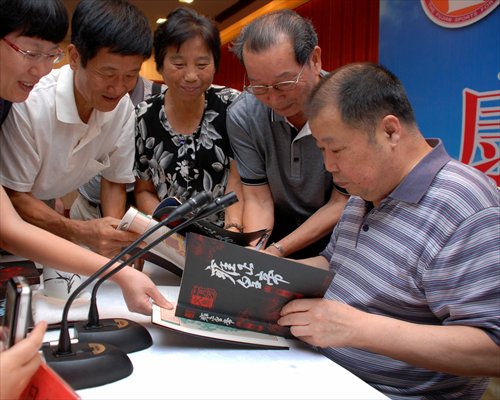Famous historic novel writer Eryuehe discusses anti-corruption and cultural innovation

Eryuehe (Right) attends a book signing for fans in Fujian Province on September 14, 2010. Photo: IC
Widely known for his Chinese Emperor serial novels which include books about the Kangxi, Yongzheng and Qianlong emperors, Chinese mainland writer Ling Jiefang, known by his pen name Eryuehe, is perhaps one of the most wanted but hard-to-get interviewees. Born in Shanxi Province and now living in the Nanyang, Henan Province, Eryuehe seldom appears in the media despite his profound influence.
Screenworks adapted from his works have proven popular overseas, especially in Asian countries like South Korea and Japan, and helped actors such as Chen Daoming and Tang Guoqiang gain popularity overseas.
The media paid even more attention to him after he expressed his opinion on the issue of anti-corruption during the "two sessions" (the annual sessions of the National People's Congress and The National Committee of The Chinese People's Political Consultative Conference) in 2014 and Wang Qishan, the secretary of the Central Commission for Discipline Inspection of the CPC, referred to him as a good friend.
In attendance as a member of the National People's Congress (NPC) during this year's two sessions, which are currently underway in Beijing, Eryuehe has once again entered the media spotlight. Recently, he sat down with the Global Times to discuss the issue of anti-corruption and cultural innovation.
What follows are his words.
China's anti-corruption history
I don't label myself as a writer. Honestly speaking, I mostly studied and focused on those things I saw while part of an inspection tour with the Henan Province delegation. In recent years I have spoken more about the issue of anti-corruption on different occasions. Last year, the Chinese People's Publishing House published a new book about me, Eryuehe Speaks on the Issue of Anti-Corruption, which collects some of my views and articles on this issue. This book can be seen as me fulfilling my duties as a deputy of the NPC.
I'm not an expert on the issue of anti-corruption. In fact, I consider it based on my knowledge of history and my conscience as a writer. This is actually a kind of social awareness. Combating corruption and building a clean government should not just be (the duty of) or be on the behalf of the interests of a certain class or group. People who have a sense of justice and social awareness should all support the Party's stance on anti-corruption. This is a task that is required in any social system.
As a writer of historic novels, I tend to reflect on the issue from the angle of history. With a more than 5,000-year long history, China has the most complete materials on government in history, especially when it comes to the past 2,000 to 3,000 years. It's possible that the combined anti-corruption history of the Western world would still not reach the scope of China's.
We have learned a lot from history. Our traditional culture and customs are the foundation upon which we deal with this issue. From that we have developed a comprehensive anti-corruption system based on our current social and economic situation. This is very rare in the history of any country in the world. How many other countries have such a multi-layered anti-corruption system which includes top-down inspection teams, educational teams and Internet reports? This type of system is actually very powerful and effective.
Cultural innovation
I focused more on the cultural side of things when I was part of the team investigating and surveying local areas. We have very ancient and beautiful villages where the roads are paved in stone. It was places like these that once nurtured imperial exam champions. These places made a huge impression on me. We carried out research on the culture of the Sanmenxia area (in Henan Provice) during the Spring and Autumn (770BC-476BC) and Warring States (475BC-221BC) periods. I was very interested in exploring those seldom seen temples or cultural relics to study the history behind them.
During this process, I realized that cultural innovation is another issue that I need to talk about with the public. Innovation is one of the key and leading parts of our "Five Development Concepts" (which were proposed during the 5th Plenary Session of the 18th Central Committee of the CPC in October 2015). I feel that, compared to the innovation in our economic and social development, our cultural innovation has lagged behind, failing to keep step with economic reform.
Take the CCTV's Spring Festival Gala as an example. Every year, people across the country are very enthusiastic and have great expectations towards it. CCTV goes to great lengths to bring in the best actors and use the most sophisticated equipment for the gala. However, the results are not satisfying. I think this happens because of the lack of cultural innovation and shortage of quality programming that has kept up with the current times.
No matter if we are talking about comedy, tragedy or satire, they should be serious about their themes. This is in line with current reform.
On the other hand, during this current wave of reform, the thoughts and views of private entrepreneurs, white and blue collars, migrant workers and unemployed village youths should be reflected in our cultural works. In the past we worked for the proletariat, now we work for socialism. The guiding principle of "letting a hundred flowers bloom and a hundred schools of thought contend" is still in force. I can see the director of the Spring Gala is trying to realize this but has failed.
A lack of cultural innovation is also reflected in the merging of rural and urban cultures. The popular songs and dances in villages are all old. They lack fresh cultural topics. Reform is supposed to create our times and continually re-shape it. Culture activities should stay in step with overall reform.
Read more in Special Coverage:
Newspaper headline: Learning from history